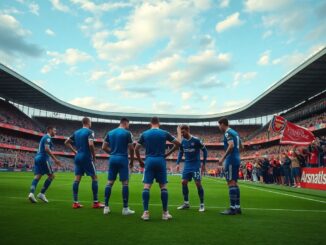A look at the repercussions of footballers' misbehavior during holidays, revealing lessons for athletes and their teams.

Topics covered
In the world of professional football, the spotlight often shines not just on the pitch but also on the off-field antics of players. The recent incident involving Kian Harratt, a striker for Oldham Athletic, serves as a stark reminder of the consequences that can arise from seemingly trivial moments.
But what happens when a footballer’s holiday escapades stir up controversy? Let’s dive into the hard truths behind these incidents, their underlying business implications, and the lessons we can learn from both successes and failures.
Unpacking the Harratt Incident
Kian Harratt recently found himself in hot water after a video surfaced showing him throwing a plastic chair at a woman during a confrontation at a hotel in Ibiza.
This incident, which followed a match where he helped secure promotion for his team, prompts some uncomfortable questions about athlete behavior in leisure settings. Sure, it might be easy to label this as youthful indiscretion, but the reality is that such actions can have lasting repercussions on a player’s career.
When we take a closer look at the data surrounding player conduct, a pattern emerges: incidents like Harratt’s can lead to increased media scrutiny, potential legal troubles, and a tarnished public image. Fans can quickly turn, and loyalty often wanes when players engage in negative behaviors. Harratt’s situation is a perfect case study in how quickly one moment can overshadow an athlete’s professional achievements. Have you ever thought about how a single misstep can change the narrative of a player’s career?
Lessons from the Past: A Look at Notorious Incidents
Harratt isn’t the only one to stumble; history is filled with footballers who have found themselves in trouble during vacations. Take the West Bromwich Albion players, for example, who were caught stealing a taxi while in Barcelona. This incident made headlines and led to significant repercussions, including Jonny Evans losing his captaincy. The fallout from such actions can disrupt team dynamics and player morale, highlighting the delicate balance athletes must strike between personal freedom and professional responsibility.
Similarly, consider Jack Grealish’s infamous 2015 incident in Tenerife, where he was photographed in a compromising position. His reputation took a hit, and while he eventually rose to fame, that initial backlash had a real impact on his career trajectory and brand image. It goes to show that even the most talented players can face hurdles due to their off-field behavior. So, what does it take to keep your brand intact in the face of such challenges?
Practical Takeaways for Founders and Players Alike
For founders and product managers in the sports business, there are critical lessons to glean from these incidents. First, understanding the importance of brand management is essential. Just as a company must monitor its public image, athletes need to recognize that their actions—especially in public settings—reflect on their personal brand and their team’s reputation. The data tells us that negative publicity can lead to decreased sponsorship opportunities and dwindling fan support, ultimately affecting a player’s marketability. Isn’t it fascinating how closely linked personal actions and professional success can be?
Moreover, the importance of proactive communication cannot be overstated. Teams and players alike must have strategies in place to address controversies swiftly and effectively. Transparency and accountability can mitigate backlash and cultivate trust among fans and stakeholders. After all, who wouldn’t appreciate a little honesty when things go south?
Conclusion: Moving Forward with Awareness
As we reflect on the incidents involving Kian Harratt and others, it’s clear that the football community must stay vigilant. The interplay between personal behavior and professional reputation is often overlooked, but it carries significant weight. For players, understanding the implications of their actions during off-field moments is crucial. For teams and founders, building a culture that emphasizes responsibility and accountability can help avert the pitfalls of fame and fortune.
Ultimately, the goal should be to foster an environment where athletes can thrive both on and off the field, learning from their mistakes while maintaining a strong commitment to their professional obligations. So, how can we create a culture that supports this balance? The answer lies in awareness, responsibility, and a commitment to growth.




